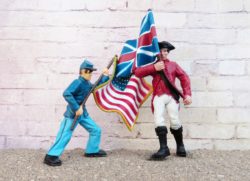
It’s all the same language, but it’s different – American versus British English. And the British did have it first. The differences between American and British English are pretty minor, though. An American can understand someone speaking British English – except maybe for the accent!
The differences between American English and British English show up in three ways: 1. Some words are spelled differently. 2. There are a few punctuation and grammar rules that differ. 3. Some words are different between American English and British English, but they mean the same thing. Most words, however, are spelled the same in both British and American English. And most grammar and punctuation rules are the same. And most of the words are the same.
Next week we will concentrate on the minor spelling, grammar, and punctuation differences. But today we will talk about the vocabulary. When a British person talks about putting on trainers, we would put on sneakers. Here are just a few of the words that differ between British and American vocabulary:
British – American
agony aunt – advice columnist
anticlockwise – counterclockwise
aubergine – eggplant (not sure if this is just the color or the vegetable)
biscuit – cookie
bonnet – hood (of a car)
boot – trunk (of a car)
braces – suspenders
candy floss – cotton candy (don’t floss your teeth with it!)
chips – french fries
court card – face card
crisps – potato chips
drawing room – living room
film – movie
flat – apartment
football – soccer
fortnight – two weeks
hairslide – barrette
handbag – purse or pocketbook
hen night – bachelorette party
holiday – vacation
hoover – vacuum cleaner
ice lolly – Popsicle
jacket potato – baked potato
jumper – pullover sweater
lift – elevator
loo – restroom, bathroom
lorry – truck
maths – math (I have no idea why)
mobile phone – cell phone
nappy – diaper
peckish – hungry
post – mail
pram – baby carriage
pushchair – baby stroller
queue – line
rubber – eraser (please don’t use this one incorrectly!)
underground – subway
zed – zee



Another one that comes to mind immediately is plaster = bandaid.
“Maths” (or “mathematics”) is used because maths is studied in a more interdisciplinary manner rather than dividing algebra, geometry, trigonometry, etc. into separate classes.
Thanks! I have not heard of plaster for bandaid. Good explanation for why it is called maths!
Did you know that “loo” has a French origin? It’s the “lieu”, the place!
I remember working in a grocery/caterer shop in New Jersey. Once, we had a dish made with eggplants. But nobody wanted to buy eggplants. So we named the dish Aubergine… We never sold a dish so quickly!
Also, eggplants can be purple or whitish, hence the word egg plant. But aubergine is definitely a purple color.
Thanks for the list, it’s very useful for a teacher of English (me!)
Agnès
Thank you for that info! I did not know that. I like the sound of aubergine parmesan!
Hi Arlene,
Some more explanations.
We also use ‘suspenders (on a suspender belt) are used to hold up a woman’s stockings (If anybody still wears them!)
We also use living room … they’re interchangeable
Hoover is slang and we also use vacuum cleaner (we did, after all, invent them!)
It’s Maths short for Mathematics (to keep the word plural)
Thanks! Comment on maths: mathematics, although ending in s, is still singular and used with a singular verb (like news, physics, etc.). Do you use a singular or plural verb with maths??
Aubergine is the fruit as well as the color. I have heard them use it on cooking shows.
Thank you for the info. I could have looked it up, but…